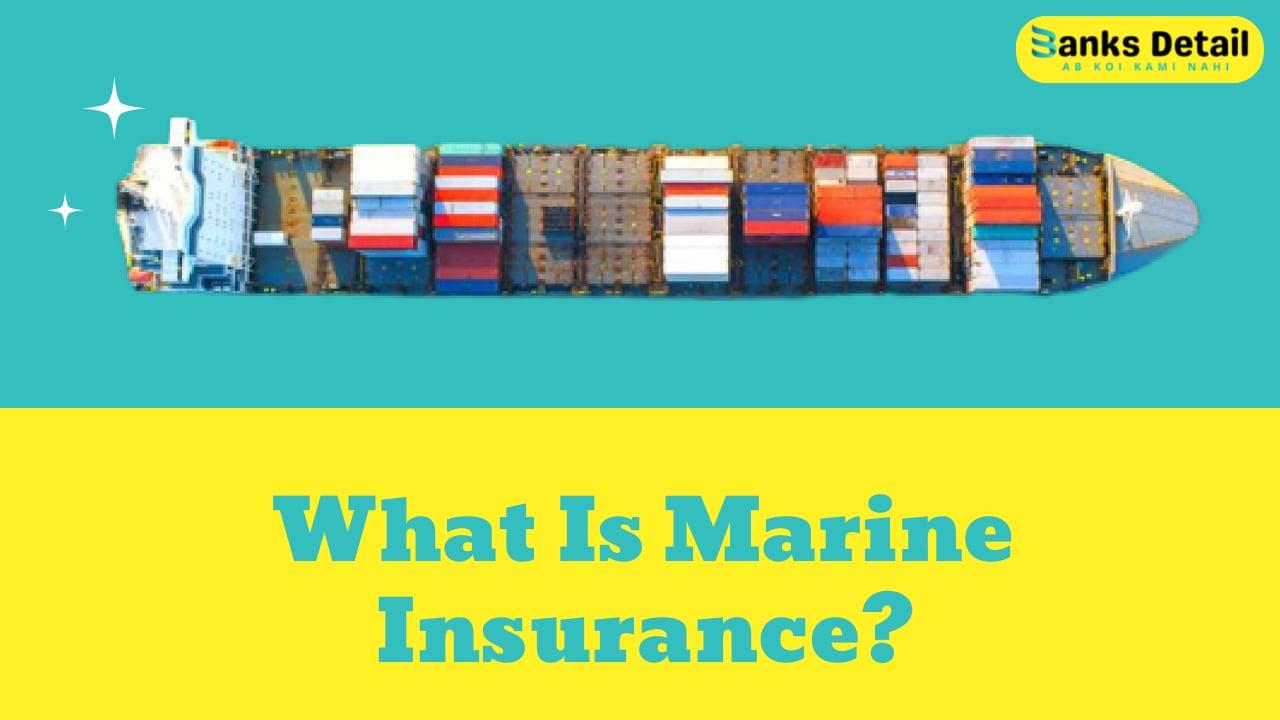Marine Insurance: Comprehensive Coverage for Maritime Risks

Marine insurance plays a vital role in safeguarding businesses involved in the shipping industry against the numerous risks associated with maritime operations.
This comprehensive insurance coverage provides protection for vessels, cargo, and liabilities, ensuring the continuity of maritime activities.
In this article, we will delve into the intricacies of marine insurance, exploring its types, benefits, and the key concepts that underpin this crucial aspect of the maritime world.

Understanding Marine Insurance
Marine insurance, also known as maritime insurance, is a specialized form of insurance that covers various risks associated with the transportation of goods, vessels, and related liabilities.
It provides financial protection against the loss or damage of vessels, cargo, and third-party claims that may arise during maritime operations.
Marine insurance policies encompass a range of coverage options tailored to meet the specific needs of businesses operating in the shipping industry.
Types of Marine Insurance
- Hull Insurance: Hull insurance provides coverage for physical damage to the vessel. It protects against risks such as collisions, accidents, and natural disasters that can lead to damage or loss of the vessel.
- Cargo Insurance: Cargo insurance covers goods being transported by sea, providing protection against risks such as theft, damage, or loss during transit. Different types of cargo insurance policies are available to address specific cargo-related risks and requirements.
- Liability Insurance: Liability insurance protects businesses against claims made by third parties for damages caused by their vessels. It covers legal expenses and compensation related to bodily injury, property damage, or pollution incidents resulting from maritime operations.
- Freight Insurance: Freight insurance covers the loss of freight revenue in the event of goods not reaching their intended destination. It provides financial protection for businesses in the shipping industry when shipments are delayed, lost, or damaged during transportation.
Benefits of Marine Insurance
Marine insurance offers several benefits to businesses and individuals involved in maritime activities. Here are some key advantages:
- Mitigation of Financial Risks: Marine insurance mitigates financial risks associated with maritime operations, providing a safety net against potential losses from vessel damage, cargo loss, or liability claims.
- Protection against Unforeseen Events: The unpredictable nature of the sea and maritime operations makes marine insurance essential. It protects businesses from unexpected events such as storms, accidents, theft, and other risks inherent in the shipping industry.
- Enhancing Business Continuity: By providing financial coverage for vessel damage and cargo losses, marine insurance helps businesses maintain continuity in their operations. It safeguards their assets and ensures they can recover and continue operating even in the face of adversity.
Key Concepts in Marine Insurance
To fully grasp the intricacies of marine insurance, it’s essential to understand some key concepts that underpin this specialized field.
Voyage Policy vs. Time Policy
When it comes to marine insurance, there are two primary types of policies: voyage policies and time policies.
A voyage policy provides coverage for a specific journey or voyage, while a time policy offers coverage for a defined period, typically a year. The choice between these policies depends on the nature of the shipment and the specific requirements of the insured party.
General Average
General average is a principle in marine insurance that refers to the apportionment of losses and expenses incurred during a maritime adventure among the vessel owner, cargo owners, and other interested parties.
In situations where sacrifices are made or extraordinary expenses are incurred to safeguard the vessel or cargo, a general average act is declared, and the costs are shared proportionally.
Salvage and Subrogation
Salvage operations involve the recovery of vessels or cargo that are in distress or imminent danger at sea. Salvors, who provide assistance during such operations, are entitled to a salvage reward.
Subrogation, on the other hand, is the legal process where an insurer takes over the rights of the insured party and seeks recovery for the losses or damages incurred.
Particular Average
Particular average refers to the partial loss or damage to a vessel or cargo that is not shared among all the interested parties, unlike general average.
It involves the assessment and calculation of the specific loss or damage incurred by an individual vessel or cargo owner.
Factors Affecting Marine Insurance Premiums
Several factors influence the premiums of marine insurance policies. Insurance providers consider these factors when determining the cost of coverage. Here are some key factors that affect marine insurance premiums:
- Vessel Details:
- Age, condition, and value of the vessel
- Classification and certification of the vessel
- Cargo Details:
- Nature, value, and vulnerability of the cargo
- Packaging and handling requirements
- Voyage Details:
- Route, duration, and geographical risks
- Seasonal variations and weather conditions
- Loss History and Risk Management:
- Claims history and risk prevention measures
- Impact of loss prevention on insurance premiums
It’s important for businesses to understand these factors and take appropriate measures to mitigate risks and potentially reduce their marine insurance premiums.
Choosing the Right Marine Insurance Provider
Selecting the right marine insurance provider is crucial for obtaining reliable coverage and ensuring smooth claim processes. Consider the following factors when choosing a marine insurance company:
- Reputation and Experience: Look for providers with a strong reputation and extensive experience in the marine insurance industry. Research their track record and assess customer reviews and ratings.
- Financial Stability: Ensure that the insurance company has the financial strength to fulfill its obligations in the event of a claim. Check their financial ratings and stability indicators.
- Customer Service: Evaluate the quality of customer service provided by the insurance company. Prompt and efficient claim handling and responsive customer support are essential in the maritime industry.
It’s advisable to consult with insurance brokers or seek professional advice to determine the most suitable marine insurance provider for your specific needs.
Lesser-Known Aspects of Marine Insurance
While the core concepts and types of marine insurance are well-known, there are lesser-known aspects worth exploring. These include:
Institute Cargo Clauses
The Institute Cargo Clauses (A, B, and C) are standard terms used in marine cargo insurance policies. Each clause defines the extent of coverage, exclusions, and limitations.
Familiarizing yourself with these clauses can help you understand the coverage provided by your cargo insurance policy.
War and Strikes Clauses
Marine insurance policies often exclude coverage for risks related to war and strikes. However, additional coverage options are available to address these specific risks.
It’s important to assess your exposure to war and strikes risks and consider appropriate coverage based on your operations and geographic locations.
Uncommon Exclusions in Marine Insurance
Marine insurance policies may include uncommon exclusions or limitations that are specific to certain risks or circumstances.
It’s essential to carefully review your policy to understand any exclusions or limitations that may impact your coverage.
Frequently Asked Questions (FAQs)
What is marine insurance in insurance?
Marine insurance, also known as maritime insurance, is a type of insurance that provides coverage for risks associated with marine activities. It is designed to protect businesses and individuals involved in the shipping industry against potential losses or damages related to vessels, cargo, and liabilities.
Marine insurance policies are specifically tailored to address the unique risks and challenges faced by those operating in maritime environments. The coverage provided by marine insurance can vary depending on the specific policy and the needs of the insured party.
The main components covered by marine insurance include:
Hull Insurance: This aspect of marine insurance provides coverage for physical damage to the vessel, including collisions, accidents, and natural disasters.
Cargo Insurance: Cargo insurance offers protection for goods being transported by sea against risks such as theft, damage, or loss during transit.
Liability Insurance: Liability insurance covers businesses against claims made by third parties for damages caused by their vessels. It includes coverage for bodily injury, property damage, or pollution incidents resulting from maritime operations.
In addition to these primary components, marine insurance can also encompass other aspects such as freight insurance, which covers the loss of revenue in the event of delayed, lost, or damaged shipments, and various specialized coverage options tailored to specific needs.
Overall, marine insurance plays a critical role in mitigating the financial risks associated with maritime activities, ensuring the continuity of operations for businesses involved in the shipping industry, and providing peace of mind to individuals and organizations engaged in marine endeavors.
What are 2 types of marine insurance?
Two common types of marine insurance are:
Hull Insurance: Hull insurance provides coverage for physical damage to the vessel. It protects the vessel owner against risks such as collisions, accidents, and natural disasters that can lead to damage or loss of the vessel. This type of insurance ensures that the owner is financially protected and can repair or replace the vessel in case of damage.
Cargo Insurance: Cargo insurance covers goods being transported by sea. It provides protection against risks such as theft, damage, or loss during transit. Cargo insurance is crucial for businesses involved in importing, exporting, or shipping goods internationally. It safeguards the value of the cargo and ensures compensation in the event of any damage or loss during the transportation process.
These two types of marine insurance address different aspects of the maritime industry and provide coverage for the primary assets involved in maritime operations, namely the vessel and the cargo being transported.
What are the different types of marine insurance?
Marine insurance encompasses various types of coverage tailored to address the diverse risks associated with maritime activities. The different types of marine insurance include:
Hull Insurance: This type of insurance provides coverage for the physical damage to the vessel itself. It protects against risks such as collisions, accidents, fires, storms, and natural disasters that can result in damage or loss of the vessel.
Cargo Insurance: Cargo insurance offers coverage for goods being transported by sea. It protects against risks such as theft, damage, loss, or destruction of the cargo during transit. Cargo insurance ensures that businesses involved in international trade or shipping have financial protection in case of any unforeseen incidents affecting the cargo.
Liability Insurance: Liability insurance covers the legal and financial liabilities of vessel owners or operators. It provides protection against claims made by third parties for bodily injury, property damage, pollution incidents, or other liabilities arising from maritime operations. Liability insurance is essential for businesses involved in shipping, chartering vessels, or operating ports and terminals.
Freight Insurance: Freight insurance, also known as freight forwarder’s liability insurance, covers the financial loss incurred by freight forwarders in the event of cargo damage, loss, or delay during transportation. It protects against liabilities arising from the freight forwarder’s contractual obligations and responsibilities in managing the logistics of cargo shipments.
Protection and Indemnity (P&I) Insurance: P&I insurance is a specialized form of liability insurance that provides coverage for a wide range of risks not typically covered by standard marine liability policies. It offers protection against liabilities related to crew injuries, pollution, collision liability, wreck removal, and other risks specific to the maritime industry.
Builders’ Risk Insurance: Builders’ risk insurance provides coverage for vessels under construction or undergoing major renovations. It protects against risks such as damage to the vessel during the construction process, equipment failure, or other unforeseen events that may occur during the building or repair stages.
War Risk Insurance: War risk insurance covers risks associated with war, acts of terrorism, piracy, or other hostile actions. It provides protection for vessels and their cargo when navigating through high-risk areas or during times of political instability or conflict.
These are some of the key types of marine insurance available to individuals, businesses, and organizations operating in the maritime industry. The specific coverage needed may vary depending on the nature of the operations, the type of vessels involved, and the specific risks faced by the insured party.
Why is marine insurance taken?
Marine insurance is taken for several reasons, primarily to mitigate the financial risks and uncertainties associated with maritime activities. Here are some key reasons why marine insurance is necessary:
Protection against Loss or Damage: Marine insurance provides coverage for potential losses or damages to vessels, cargo, and other marine assets. It safeguards the financial interests of vessel owners, cargo owners, and other parties involved in maritime operations by compensating for the losses incurred due to unforeseen events such as accidents, natural disasters, theft, or piracy.
Compliance with Legal and Contractual Requirements: Marine insurance is often a legal or contractual requirement. Many countries and jurisdictions mandate certain types of marine insurance coverage to ensure the safety and financial security of maritime operations. Additionally, contracts with shipping companies, charterers, or cargo owners may require specific insurance coverage as a condition of doing business.
Liability Protection: Marine insurance offers liability coverage, protecting vessel owners and operators against claims made by third parties for bodily injury, property damage, pollution incidents, or other liabilities arising from maritime operations. It helps businesses manage potential legal and financial liabilities, including legal defense costs and settlement amounts.
Risk Management and Business Continuity: By transferring the risks associated with marine activities to insurance providers, businesses can effectively manage and mitigate potential losses. Marine insurance enables businesses to continue their operations with confidence, knowing that they have financial protection in place in case of any unforeseen events or accidents.
Financing and Investment Protection: Marine insurance is often required by financial institutions or lenders that provide financing for vessels or cargo. Lenders typically require insurance coverage to protect their investments and ensure that they will be repaid in the event of any damage or loss to the financed assets.
Peace of Mind: Marine insurance provides peace of mind to individuals and businesses involved in maritime activities. It allows them to focus on their core operations without constantly worrying about the financial risks and uncertainties associated with shipping, transporting goods, or operating vessels.
Given the complex nature of maritime operations and the potential for significant financial losses, marine insurance plays a vital role in protecting the interests of all parties involved and ensuring the smooth functioning of the global maritime industry.
Why is it called Marine Insurance?
Marine insurance is called so because it originated from the need to provide insurance coverage for risks specifically associated with maritime activities and operations. The term “marine” refers to the sea or anything related to the sea, and “insurance” refers to the transfer of risks through a contractual agreement.
The development of marine insurance can be traced back to the early days of seafaring when ships and cargo faced numerous hazards during voyages, such as storms, pirates, collisions, and shipwrecks. As trade expanded and maritime commerce grew, there arose a need to protect the financial interests of ship owners, cargo owners, and other parties involved in maritime trade.
Insurance providers recognized the unique risks and challenges of the maritime industry and began offering specialized coverage to address these risks. Over time, this type of insurance became known as marine insurance or maritime insurance.
The term “marine insurance” is used to encompass a range of insurance policies that cover various aspects of the shipping industry, including vessels, cargo, liabilities, and related risks. It is a specific branch of insurance that focuses on the risks and perils faced by those involved in maritime activities, both on land and at sea.
By using the term “marine insurance,” it distinguishes this particular type of insurance from other forms of insurance that cover different industries or sectors. The name helps to clearly identify and communicate the purpose and scope of the insurance coverage, emphasizing its association with the maritime domain.
What is marine insurance and its scope?
Marine insurance is a specialized form of insurance that provides coverage for risks and perils associated with maritime activities and operations. It is designed to protect the financial interests of individuals, businesses, and organizations involved in the shipping industry, as well as those engaged in activities related to vessels, cargo, and marine liabilities.
The scope of marine insurance is comprehensive and covers a wide range of areas within the maritime sector. Here are the key aspects covered by marine insurance:
Vessels: Marine insurance provides coverage for vessels, including ships, boats, yachts, and other types of watercraft. It protects against risks such as physical damage, accidents, collisions, theft, fire, and natural disasters. This coverage ensures that vessel owners have financial protection in case of damage or loss to their vessels.
Cargo: Marine insurance offers coverage for goods being transported by sea. It protects against risks such as theft, damage, loss, or destruction of the cargo during transit. Cargo insurance provides compensation to cargo owners for any financial losses incurred due to unforeseen events that affect the cargo.
Liabilities: Marine insurance addresses liabilities arising from maritime activities. It offers protection against claims made by third parties for bodily injury, property damage, pollution incidents, or other liabilities resulting from maritime operations. Liability insurance safeguards businesses and vessel owners against legal and financial risks associated with their operations.
Freight: Marine insurance includes coverage for freight, which refers to the revenue earned from transporting goods by sea. It protects businesses against financial losses in the event of delayed, lost, or damaged shipments, ensuring that they are compensated for the loss of revenue.
Specialized Coverages: Marine insurance also encompasses specialized coverages tailored to specific needs within the maritime industry. This can include policies such as builders’ risk insurance for vessels under construction or undergoing renovations, war risk insurance for protection against risks related to war or acts of terrorism, and protection and indemnity (P&I) insurance for additional liability coverage beyond standard marine liability policies.
The scope of marine insurance extends to global maritime trade, shipping companies, cargo owners, vessel owners, freight forwarders, ports, terminals, and other entities involved in maritime activities. It provides financial security, risk management, and peace of mind to those operating in the dynamic and challenging maritime environment.
Overall, marine insurance plays a crucial role in safeguarding the interests of individuals and businesses engaged in the maritime industry, ensuring the continuity of operations, and mitigating the financial risks associated with marine activities.
Conclusion
Marine insurance plays a crucial role in safeguarding businesses and individuals involved in maritime activities.
With its various types of coverage, marine insurance offers protection against vessel damage, cargo losses, and liability claims.
By understanding the key concepts and factors that influence marine insurance, businesses can make informed decisions, choose the right coverage, and effectively manage risks in the shipping industry.
Remember to consult with insurance professionals to tailor your marine insurance policy to your specific needs and ensure comprehensive protection for your maritime operations.
Read More About:- Insurance, Marine Insurance





